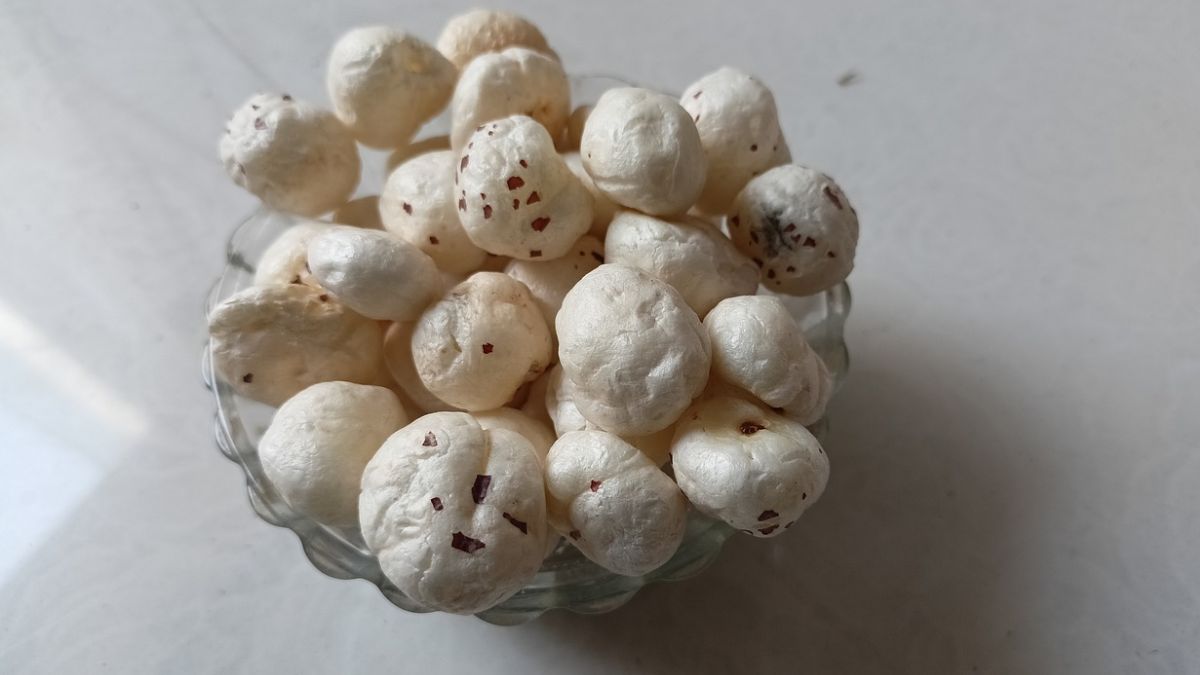The humble makhana has come to the spotlight since Union Finance Minister Nirmala Sitharaman announced in the Budget speech Saturday (February 2) that a “Makhana Board” will be set up in Bihar.
“A Makhana Board will be established in the state to improve production, processing, value addition, and marketing of makhana. The people engaged in these activities will be organised into FPOs. The Board will provide handholding and training support to makhana farmers and will also work to ensure they receive the benefits of all relevant Government schemes,” the finance minister said.
Bihar accounts for nearly 90 per cent of the total makhana production in India. The dried snack has gained popularity worldwide as a “superfood”. Here’s a look at its soft power.
Makhana’s soft power
Makhanas, known as fox nuts in English, are the edible seed of a type of water lily called euryale ferox. They are highly nutritious and rich in B vitamins, protein and fibre.
Makhana has become a top choice for fitness enthusiasts globally as it is a gluten-free and low-fat snack, with some hailing it as a superfood. As per The Hindu report, it is sold in the international wholesale market at about Rs 8,000 per kg, a major jump from Rs 1,000 about a decade ago.
According to the market research firm Spherical Insights, the global makhana market was valued at $43.56 million in 2023 and is expected to reach $100 million by 2033.
Also known as lotus seeds, makhanas have emerged as a dietary choice for many looking for a healthy lifestyle.
Besides a snack, fox nuts can be consumed in desserts like kheer or savoury dishes. Many brands like Farmley and Mr Makhana have started selling flavoured makhana packs. The industry estimates the size of the flavoured makhana market at Rs 150 crore every year, reported Mint.
Last month, Zerodha co-founder Nikhil Kamath acknowledged the global appeal of the once-humble makhana. “Maybe room here to build a really large brand, an Indian brand that sells to the world. Personally, I’m hooked on Makhana,” he wrote on X.
Maybe room here to build a really large brand, an Indian brand that sells to the world.
— Nikhil Kamath (@nikhilkamathcio) January 17, 2025
Personally, I'm hooked on Makhana. pic.twitter.com/eu5yK804Ny
How makhana is grown
The seeds of the prickly water lily are harvested to produce makhana. The plant grows in freshwater ponds across South and East Asia.
It has large and circular leaves that perch on the top of the pond, while seeds form in pods under water.
Earlier, farmers used to dive into the deep, muddy pond to collect the seeds. “While we are at the bottom diving, mud enters our ears, eyes, nose and mouth. Lots of us have skin issues due to this. Also, the plant is covered in thorns, which give us cuts all over our body during harvesting of the seeds,” Bihar’s Phool dev Shahni, who used to dive to collect lotus seeds, told BBC last August.
Now, the process of cultivating makhanas has changed. The water lily is often grown in fields, in much shallower water.
Traditionally, after makhanas are harvested, they are washed, roasted and then struck with a mallet-like object to make them “pop”.
However, machines have now been developed to roast and pop the fox seeds, reported BBC.
ALSO READ: Nirmala Sitharaman’s Budget 2025 is all about ‘GYAN’. Here’s what it means
How Bihar will benefit
About 90 per cent of India’s makhanas are grown in Bihar. According to a 2020 paper by the Indian Council of Agricultural Research, “Makhana crop is grown in almost 15,000 hectares in Bihar which produces nearly 10,000 tonnes of popped makhana.”
The production is spread over nine districts of northern and eastern Bihar — Darbhanga, Madhubani, Purnea, Katihar, Araria, Kishanganj, Saharsa, Supoul and Sitamarhi, noted Indian Express.
Makhanas are also produced in Assam, Manipur, West Bengal, Tripura and Odisha, as well as in countries like Nepal, Bangladesh, China, Japan, and Korea.
While Bihar is the largest producer of makhanas, it has failed to tap into the growing demand domestically as well in the global market. In fact, Punjab and Assam are the largest makhana exporters in India.
This is due to the lack of a food processing industry, low productivity, the required export infrastructure and an airport with cargo holds in Bihar, as per Indian Express.
“Thus, Bihar ends up selling all its fox nuts as raw material to FPUs (food processing units) outside the state at cheap prices. These FPUs add value to the product through flavouring and packaging, and thus command better prices,” a senior bureaucrat in Bihar told the newspaper on the condition of anonymity.
“Additionally, since the market in Bihar is not well-developed and organised, there is a long chain of intermediaries leading to those engaged in fox nut farming getting very low prices compared to what makhana commands in the commercial market. Thus, neither the farmer, nor the state — in terms of revenue — earns what they actually can,” the bureaucrat said.
About five lakh families, mostly from the Mallah (fishermen and boatmen) community, in Bihar are involved in the farming and harvesting of Makhana.
The Makahana Board, announced by the finance minister in the Union Budget, is expected to help Bihar tackle the challenges in makhana cultivation. It is likely to provide training to farmers to make them export-centric. The board is expected to encourage investments in the food processing sector, and help develop the necessary export infrastructure, reported Indian Express.
Last year, the Bihar government urged the Centre to declare the Minimum Support Price (MSP) for makhana. The state government supports makhana cultivation through subsidies and the One District One Product scheme. However, farmers say more needs to be done.
With inputs from agencies


)
)
)
)
)
)
)
)
)



